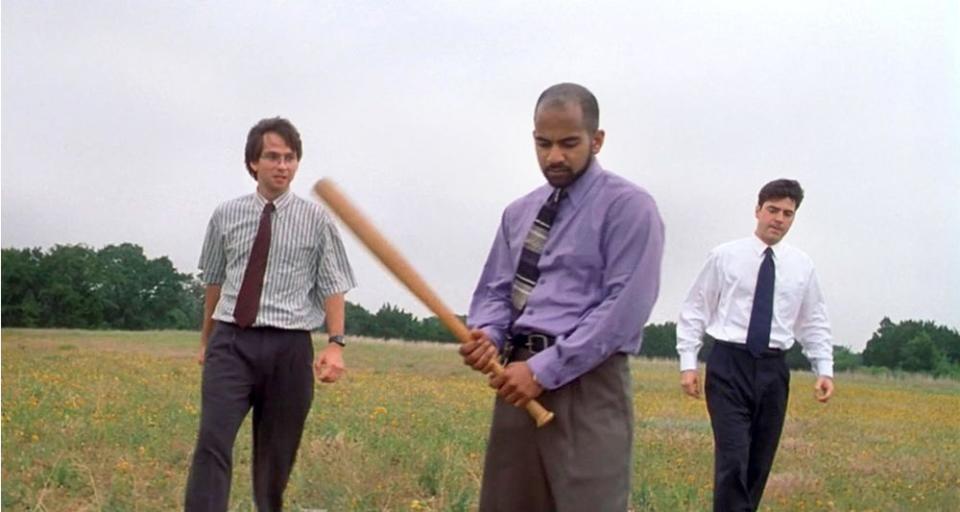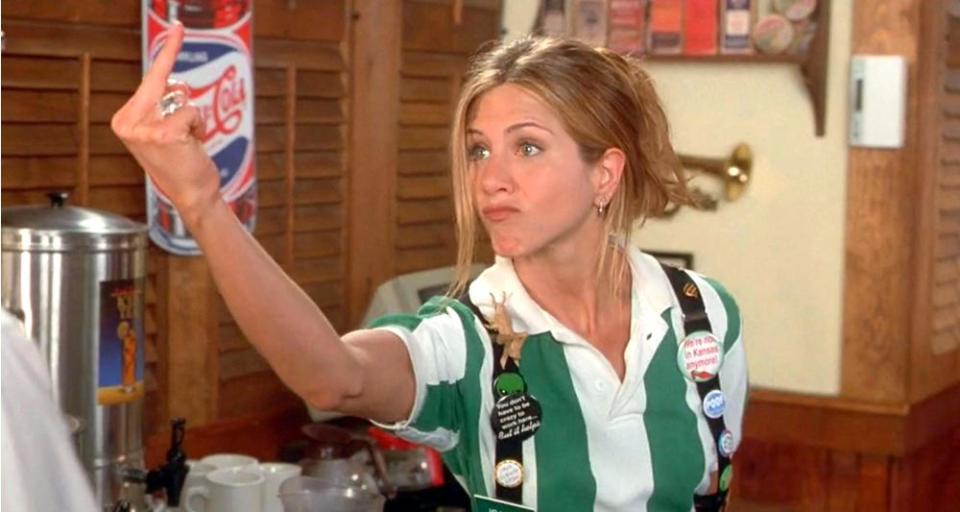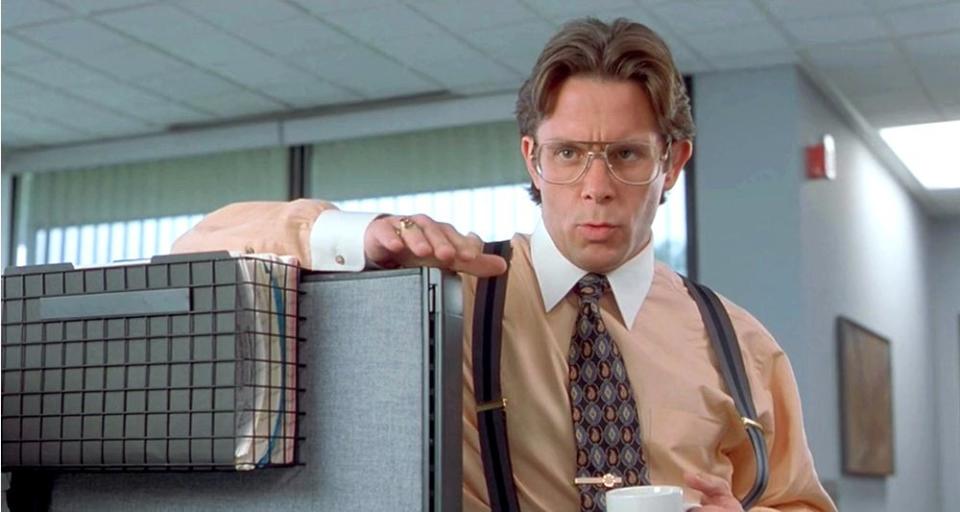The oral history of 'Office Space': Behind the scenes of the cult classic
In 1991, aspiring animator Mike Judge was a touring musician and grad student living outside of Dallas, Texas, when he channeled his past cubicle-life angst – from his former life as an engineer – into a 16mm short film called Office Space, featuring Milton. The vignette about a mumbling office worker and his condescending boss – which Judge drew, voiced and scored –would air on Comedy Central. It was a low-key launch for one of Hollywood’s most singular comedic voices who brought us the generation-defining MTV cartoon Beavis and Butt-Head, the eerily prescient 2006 satirical feature Idiocracy, and HBO’s Emmy-winning tech-nerd lampoon Silicon Valley among others.
Spatial Inspiration
Mike Judge (Writer, director, Chotchkie’s manager Stan): In 1996, I had an overall deal at [20th Century] Fox. [Network president] Peter Chernin had seen the short film and said, “This should be a movie,” so writers pitched ideas for a Milton-focused feature. I said, “It can’t be just about Milton. You don’t want to know what he does at home after work.” (Laughs) Someone said, “Make it an ensemble, like Car Wash, but in an office?” I wrote a treatment in 1996, then wrote the script after season one of [Judge’s animated Fox TV comedy] King of the Hill. Michael Bolton was the only character where I had a specific actor — David Herman — in mind.
David Herman (Michael Bolton): I’d been doing voice work on King of the Hill and also desperately trying to leave MADtv, but was under contract for seven years. Fox said, “Sorry, no. You’re our .360 hitter.” So at the next table-read, I did every sketch screaming at the top of my lungs. They took me off the show and said, “You’ll never work in this town again!” At the next table read for King of the Hill [co-creator] Greg Daniels says, “Don’t worry, you can always work here.” (Laughs) Then I read Office Space. I was in love with it.
Tom Rothman (then President of Twentieth Century Fox Film Group; current chairman of Sony Pictures Motion Picture Group): At that time, Fox had been successful with big event movies like Titanic. We needed comedies to balance the slate. When I read Office Space I wondered, “Was Mike hiding in our office?” It was the most brilliant workplace satire I’d ever read.
Judge: We did a reading at the studio in late 1997 with David, Stephen Root, who was also on King of the Hill, and some random actors. I was going to read Milton but thought, “I’d rather just sit back and listen.”
Stephen Root (Milton): So Mike shows me his little Office Space short film. I added more lisp and strangeness to Milton’s voice. He loved it.
Judge: Stephen and David killed it, but otherwise it was a disaster. The actor who read for Peter had too much swagger. I’d been miserable in my office jobs, but I never thought I deserved better. He played it wrong. I felt sick. “Well, I guess we’re not making this movie.” Then Rothman says, “The actors aren’t right, but this is a movie!” I’d felt depressed, then “Ok, I’ll make it better.”
Sanford Panitch (then executive vice-president at Fox; current President of Columbia Pictures): I have fond memories of going to Austin, where Mike lived, after that and talking about the script at his house. We’d get Mexican food. He introduced me to chorizo. (Laughs)

“GET ME MATT DAMON!”
Judge: When we got the greenlight, there wasn’t pressure at first to cast big names. They said: “Just get the best actors. It’s a low-budget movie.”
Nancy Klopper (casting director): Then Fox wanted us to pursue Ben Affleck and Matt Damon. This was post-Good Will Hunting. They weren’t exactly unknown. (Laughs)
Judge: Suddenly there was pressure. They didn’t like the actors I wanted. I came close to backing out. I told [producer] Michael Rotenberg, Let me know when it’s too late to leave.
Michael Rotenberg (producer, Judge’s manager): I’d signed Mike as a client a week before Beavis and Butt-Head premiered on MTV. Characters are like real people to him, so Fox wanting Matt Damon was hard when Mike’s saying, “But Peter doesn’t have star energy.”
Rothman: On every movie you try first to cast big stars, for marketing purposes if nothing else. It’s rarely possible to get them, however.
Klopper: Mike agreed to go to New York and meet with Matt, who was a fan of his. Then Ron Livingston’s agent asked if he could audition. He’d been in Swingers and a few TV comedies, but wasn’t well-known.
Ron Livingston (Peter): [Swingers stars] Vince Vaughn and [writer] Jon Favreau had blown up, so I think I got a little coattail effect off of that.
Klopper: Mike writes in a very specific cadence. When Ron read I was like “Oh my God.” I was knocked out.
Livingston: I did a damn good audition. (Laughs) I commandeered Nancy’s desk and started using her drawers, files and phone.
Klopper: I FedEx’d Ron’s tape to Mike in New York and wrote, “You’re not going to believe this guy.”
Judge: I asked the hotel for a VHS player. I called Nancy immediately. “I could make this movie today with Ron.” I met with Matt, who was really nice and liked the script. But I’d found Peter.
Livingston: My reps called on a Friday and said the studio wanted me to screen-test on Tuesday. “They’re wondering if you could fast until then?” I laughed. “Good one.” It was silent. “I think they’re serious.” I was like “I can try?” I didn’t think I needed to be chiseled for this role. So I jumped rope all weekend. Actually, I think I only made it to Saturday. (Laughs)
Rothman: After having tried without success to get big stars to do this little movie, we were excited to move forward with Ron.
Klopper: Then the studio said, “If you don’t have a big name for Peter, you have to have one for Joanna.”
Rotenberg: Jennifer Aniston… loved the script, but there was concern about having such a big star in a smaller role.
Jennifer Aniston (Joanna): I don’t think I was the biggest anything at the time. (Laughs) I was excited about doing a comedy like Office Space; features like that weren’t flying my way at that point.
Livingston: Jen’s agents probably told her she was going to co-star with Matt Damon. (Laughs)
Herman: Thanks to her star power, a bunch of unknowns were in the movie. Would never happen today!
Aniston: Fun fact: I’d gone to high school in New York with David Herman. I was a sophomore when he was a senior. He was a quiet, genius actor-type back then. I was sort of madly in love with him, and also terrified of him. (Laughs)
Klopper: Owen Wilson and Vince Vaughn both auditioned for Peter’s neighbor, Lawrence, but Diedrich Bader brought something special to it. Kate Hudson also read for Peter’s girlfriend. She was adorable.
Judge: I’d originally written Samir to be Iranian. I met with Ajay, who is Indian-American and asked what he was comfortable with. We decided to make the character Middle Eastern, from Jordan.
Ajay Naidu (Samir): I didn’t want Samir to sound Indian, so I worked with an Arabic dialect coach. His accent had to be very specific.
John C. McGinley (Bob Slydell): Pretty much everyone, including me, auditioned for Lumbergh, the boss character from the short film.
Judge: Gary Cole’s audition tipped the scales. He made the character 10 times funnier.
Klopper: The way he said, “Um, yeah…” — everyone lost it.
Gary Cole (Bill Lumbergh): The only comedy I’d done was The Brady Bunch Movie. But we all knew a Lumbergh; that annoying, passive-aggressive authority figure.
Klopper: We also had a Texas casting director named Jo Edna Boldin. She found Greg Pitts [Drew, the O-face guy] and tried to cast the Chotchkie’s manager there, but nobody nailed it. So Mike said, “I’ll just do it.”
Judge: Fox had said we needed to cram in more comedy. The courtroom dream sequence was Sanford’s suggestion. The ‘pieces of flair’ stuff came from a consensus that Jennifer needed more scenes. Those were last-minute adds. Having her in the movie definitely added pressure. I didn’t want to be responsible for ruining her career.
Judge: Also, I’d originally had Joanna having actually slept with Gary’s character. The studio said “No. Please make it a different Lumbergh. Jennifer can’t be in that sex-dream sequence.” (Laughs)
Tim Suhrstedt (cinematographer): Filming started May 1998. By day three, the temperature hit 100. Horrible heatwave. Fires in Mexico sent smoke to Texas. The Austin skies were totally white, so we had to keep postponing the opening traffic-jam scene.
Judge: I didn’t want the movie to feel like Texas; rather, an indeterminate setting. That’s why most of the license plates in that scene are generic.
Livingston: The hypnosis scene, then when Peter doesn’t care about anything, we ended up shooting first. I think the studio probably saw those dailies and got worried.
Judge: Early into filming they said, “Ron needs to smile more.” I’m like, “Why would he smile? He becomes happy later; we haven’t shot that stuff yet!”
Livingston: There was also concern that I was on drugs, which I wasn’t. I probably have no idea how close I got to getting fired. (Laughs)

Creating Space
Suhrstedt: Mike had been adamant that the Initech office production-design look oppressive. We actually screen-tested different gray cubicle pieces. He also wanted extra-tall cubicles so Lumbergh could lean over Peter’s desk. That was an expensive special-order. (Laughs)
Panitch :There was also a lot of discussion about T.P.S reports “looking real,” even though T.P.S reports weren’t real!
Root: Milton’s glasses were so thick, I had to wear contacts in order to see. I had zero depth perception. I had to practice reaching for the stapler. Thankfully we’d painted it red; Swingline didn’t make red ones back then.
Judge: We’d tried to use Boston and Bostitch-brand staplers, but they wouldn’t clear us to use their names.
McGinley: My scenes were mostly with [actor] Paul Willson (Bob Porter). He came up with the line, where he can’t say Samir’s last name: “Naga…naga…well, not gonna work here anymore anyway.” It was like jazz on that set.
Naidu: The part where I breakdance in the apartment was improvised too. I’d work during the day and breakdance at night with my Indian friends in Austin. We had a hardcore crew. (Laughs)
Aniston: I loved acting with Mike in the restaurant scenes. I might even have had a crush on him. He was kind, shy but had a way-wicked brain. He got the giggles a lot.
Herman: The script originally said that the real Michael Bolton was a “no-singing asshole.” We couldn’t say that because it implied that he didn’t sing his own music. So I suggested “no-talent ass clown.”
Livingston: I didn’t know what to make of Gary at first. We first met when he was in character. Then at lunch, I couldn’t tell if he was still in character. (Laughs)
Judge: We’d shot half the movie the first time we ever saw Gary laugh. It was the Lumbergh sex-dream scene. At the last minute I said, “I want to him to have his coffee cup.”
Cole: I think they even brought in Lumbergh’s suspenders at one point but Mike said, “Nah that’s a bit too much.” (Laughs)
Rage Against the Machine
Judge: My inspiration for the printer scene came from writing the Beavis and Butt-Head movie with Joe Stillman, who was in New York. I used to tell him I was going to destroy my office printer when the movie was done and videotape it.
Suhrstedt: We winged that whole sequence.
Naidu: We debated, “OK, in what authentic way would the mob beat you in a field like this?”
Livingston: I was like the mafia don walking around in the back with a bat. I don’t actually touch the printer during “the hit.”
Naidu: Years later I was in New York. Some goodfella-looking guy says to me, “We’re huge fans. What you did with that printer was so authentic.” I think I got props from the mob. (Laughs)

Market Research
Judge: When Tom Rothman saw the first cut of the movie he said, “You have to take out the gangster rap.” I said, “If the next focus group doesn’t like it, ok.” At the next one, the moderator asks, making a sour face, “What did you think of the music?” This 19-year-old kid says, “What’s great is that the movie has gangster rap, but these guys work in an office.” Rothman looks over like, “Alright, you win.’’
McGinley: The poster for Office Space was a guy covered in Post-its. He looked like Big Bird. People were like, I’m not f—ing going to a Big Bird movie!”
Judge: I wasn’t a fan of the marketing. We were polar opposite on everything. They sent me eight different cuts of the trailer. There were only two versions I absolutely hated, and those were their favorites. It was a very difficult movie to market.
Panitch: The funniest stuff wasn’t anything you could easily pull into a 15 second commercial.
Rothman: Also, we couldn’t put Jennifer’s face on the poster because the movie wasn’t about her. I think the marketers tried to get at the idea of the tagline: “Work sucks.”
Livingston: As a marketing stunt, they had a guy live inside a Plexiglas cube above Times Square for five days. I visited the cube to do press, but everyone just wanted to talk to the guy in the box. (Laughs) Then the tracking on Office Space wasn’t good. It was a foregone conclusion it wasn’t going to open well.
Rotenberg: It took a few research screenings to realize that audiences often have issues with satire.
Herman: I saw it in Westwood, CA when it opened and loved it. Then I heard how much it was making. I was like “Wow! $7 million!” People said, “No Dave, $7 million is bad.”
Suhrstedt: I saw it in Burbank — it’d already left L.A. theaters — and it was almost full! I told Mike, “It’s going to build with word-of-mouth.” But it was too late.
Judge: The movie barely made over $12 million. I was bummed. But then I got calls from amazing people. Jim Carrey invited me to his house. Chris Rock left me the best voicemail ever. I had dinner with Madonna. She said “That Michael Bolton guy is my favorite character. There’s something sexy about how angry he is.” (Laughs)
Herman: Mike calls me that night. “You won’t believe this.” I thought: How am I ever going to tell people, “You know who’s into me? Madonna.”
Aniston: Madonna and Michael Bolton: What a great couple!
Judge: I remember Fox saying, “We’ve all learned from this. Maybe next time you’ll take our input on casting? I thought, “I don’t want to do this again!”
Klopper: I was really proud of the movie. It had so many fresh faces.
Panitch: I remember being very depressed. Then the DVD came out and still used that failed Post-it marketing campaign.
Judge: I begged them to use a different concept. They compromised and put Milton on the cover, hiding behind the Post-it guy.
A cult is born
Livingston: At some point the movie got on Comedy Central, which played the hell out of it. It felt like it kind of went viral, before that concept even existed.
Cole: All my day gigs had been service jobs, like bartending. I didn’t understand the scope of the office audience until about a year later when people started shouting Office Space dialogue at me.
Rothman: Office Space is still one of Fox’s most consistently-selling DVDs.
Judge: After that, studios wanted me for big comedies. NBC even asked me to do the American version of The Office. They sent over the British version with a letter and some reviews. The first said, “The Office succeeds where movies like Office Space failed.” I passed. (Laughs). There’s been talk of doing more with Office Space, as a show or sequel, but it’s never seemed right.
Aniston: To this day, if I’m at a certain type of restaurant, people will ask, “How do you like my flair?”
Rothman: I’ve worked on movies that have won Best Picture Oscars, but I hope Office Space will be ahead of all of them in my obituary.
Root: My obit is probably going to read “Milton is dead.” (Laughs) By the way, Swingline succumbed to fan request to make a red model. I still go to sets where boxes of staplers are waiting for me from the crew.
Herman: I’ve never met the real Michael Bolton. I heard that when asked about Office Space, he’s said something like “Oh, that movie.” But apparently, he’s not taking himself as seriously anymore, which actually kinda stinks.
Judge: When [writer] Etan Cohen and I were working on the first draft of Idiocracy in 2002, we went to a Starbucks in Austin. The people behind the counter were doing the “Um, yeah…” Lumbergh shtick to each other. Etan’s like, “Are they doing that because you’re here?” Then the barista turns around and goes, “Have you guys ever seen that movie?”

